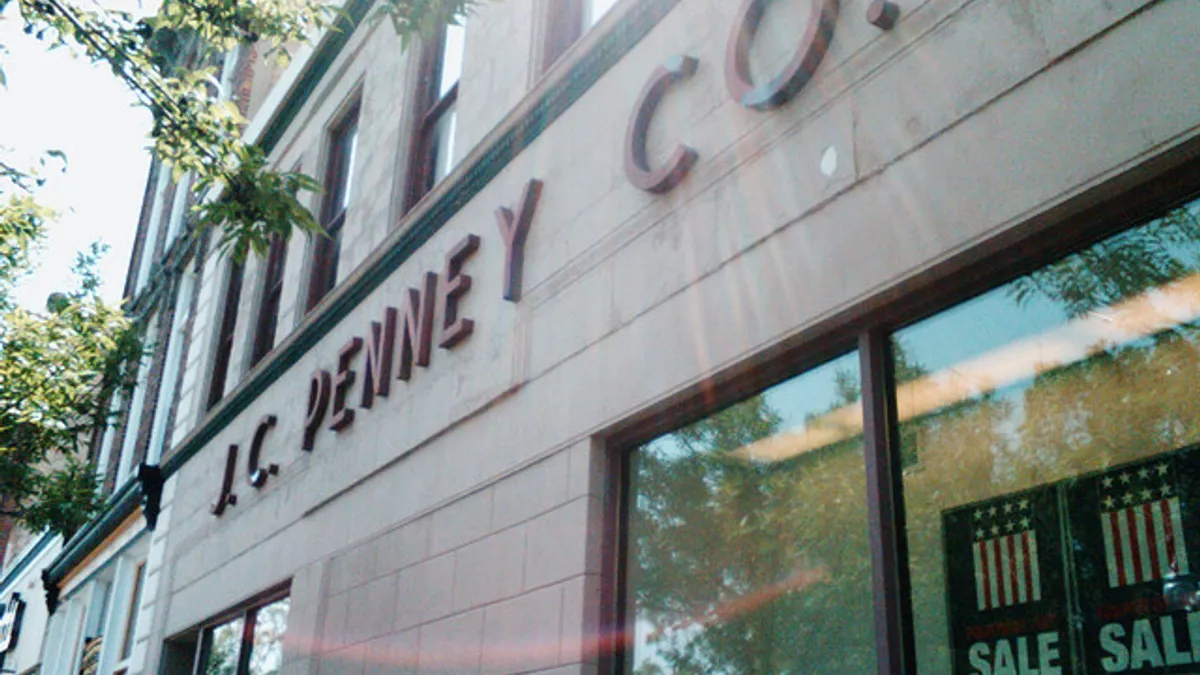Dive Brief:
- Mall operators Simon Property Group and Brookfield Property Partners have agreed in principle to acquire J.C. Penney out of bankruptcy, an attorney for the retailer said at a court hearing Wednesday.
- The deal values Penney at just under $1.8 billion all told, including cash and new term loan debt. It would also spin off some of the retailer's real estate assets into entities owned by a group of secured lenders. Those would include 161 of the Penney's real estate assets and all of its owned distribution centers, according to a press release.
- The parties have executed letters of intent and hope to file an asset purchase agreement with the court within 10 days, said Kirkland & Ellis partner Joshua Sussberg, who is representing Penney in its Chapter 11 case.
Dive Insight:
Haggling over the fate of Penney has been going on for weeks, with only news reports to fill outsiders in on the details of negotiations and the bidders vying to take over the department store chain.
Those reports named Simon and Brookfield, as well as private equity firm Sycamore Partners and Saks Fifth Avenue owner Hudson's Bay Co. as potential buyers. Last week, though, talks temporarily hit a stalemate, and Sussberg announced to the court that a group of lenders agreed to take over the company in lieu of a transaction. Now, a sale of the company is on the table and in process.
The bid by Simon and Brookfield puts Penney in a growing class of retailers to be taken over by their landlords in Chapter 11. Simon and Brookfield teamed up to buy Forever 21, while Simon and IP licensing specialist Authentic Brands teamed up this year to buy Lucky Brands and Brooks Brothers out of bankruptcy. Previously the two entities acquired Aeropostale. Regional gift specialist The Paper Store also recently sold itself in bankruptcy to a real estate firm.
Buying Penney keeps open a major anchor tenant in hundreds of malls, not least of all those of Simon and Brookfield, protects co-tenant clauses and builds a new line of business for the REITs, though it’s still an open question how well those businesses will perform in the long run.
Simon CEO David Simon said previously that the Aeropostale deal has been a success for the company while saving jobs. Moreover, the REIT and other landlords are able to buy bankrupt retailers at bargain prices, making the overall risks low.
Especially in the era of COVID-19, rents have been a source of tension and litigation. Even in normal times, expensive and unprofitable leases can tip retailers into bankruptcy. That has accelerated during the pandemic, with some retailers specifically seeking shelter from rent payments and entering Chapter 11 in part because they faced the threat of eviction.
As Sussberg noted, what he and the company have outlined so far is not the final sale but rather "the guts of a deal." Yet to come is a formal asset purchase contract, an auction wherein the Simon and Brookfield deal would serve as a stalking horse, and a court approval process that will account for any objections to the agreement that may arise.
But this is nonetheless an important moment for Penney as it tries to secure a future for itself as a living physical retailer. By several accounts it is a hard-won victory for Penney following missed deadlines, backroom bargaining, a judge’s pointed expression of impatience, and, Sussberg said, "a few screaming matches" as recently as Wednesday.
















